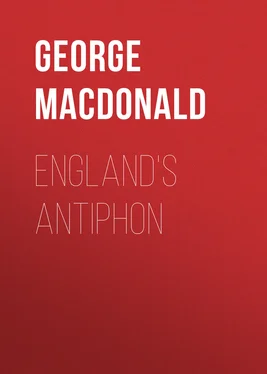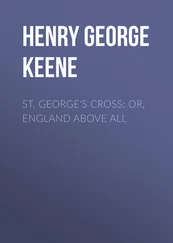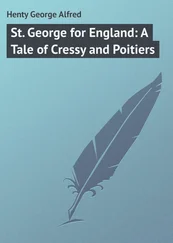George MacDonald - England's Antiphon
Здесь есть возможность читать онлайн «George MacDonald - England's Antiphon» — ознакомительный отрывок электронной книги совершенно бесплатно, а после прочтения отрывка купить полную версию. В некоторых случаях можно слушать аудио, скачать через торрент в формате fb2 и присутствует краткое содержание. Издательство: Иностранный паблик, Жанр: foreign_poetry, Поэзия, foreign_antique, foreign_prose, на английском языке. Описание произведения, (предисловие) а так же отзывы посетителей доступны на портале библиотеки ЛибКат.
- Название:England's Antiphon
- Автор:
- Издательство:Иностранный паблик
- Жанр:
- Год:неизвестен
- ISBN:нет данных
- Рейтинг книги:3 / 5. Голосов: 1
-
Избранное:Добавить в избранное
- Отзывы:
-
Ваша оценка:
- 60
- 1
- 2
- 3
- 4
- 5
England's Antiphon: краткое содержание, описание и аннотация
Предлагаем к чтению аннотацию, описание, краткое содержание или предисловие (зависит от того, что написал сам автор книги «England's Antiphon»). Если вы не нашли необходимую информацию о книге — напишите в комментариях, мы постараемся отыскать её.
England's Antiphon — читать онлайн ознакомительный отрывок
Ниже представлен текст книги, разбитый по страницам. Система сохранения места последней прочитанной страницы, позволяет с удобством читать онлайн бесплатно книгу «England's Antiphon», без необходимости каждый раз заново искать на чём Вы остановились. Поставьте закладку, и сможете в любой момент перейти на страницу, на которой закончили чтение.
Интервал:
Закладка:
Plenty bedews the desert places;
A hedge of mirth the hills encloseth;
The fields with flocks have hid their faces;
A robe of corn the valleys clotheth.
Deserts, and hills, and fields, and valleys all,
Rejoice, shout, sing, and on thy name do call.
The first stanza seems to me very fine, especially the verse, "Return possessed of what they pray thee." The third stanza might have been written after the Spanish Philip's Armada, but both King David and Sir Philip Sidney were dead before God brake that archer's bow. 66 66 There has been some blundering in the transcription of the last two lines of this stanza. In the former of the two I have substituted doth for dost, evidently wrong. In the latter, the word cradle is doubtful. I suggest cradled, but am not satisfied with it. The meaning is, however, plain enough.
The fourth line of the next stanza is a noteworthy instance of the sense gathering to itself the sound, and is in lovely contrast with the closing line of the same stanza.
One of the most remarkable specimens I know of the play with words of which I have already spoken as common even in the serious writings of this century, is to be found in the next line: "Where earth doth end with endless ending." David, regarding the world as a flat disc, speaks of the ends of the earth: Sidney, knowing it to be a globe, uses the word of the Psalmist, but re-moulds and changes the form of it, with a power fantastic, almost capricious in its wilfulness, yet causing it to express the fact with a marvel of precision. We see that the earth ends; we cannot reach the end we see; therefore the "earth doth end with endless ending." It is a case of that contradiction in the form of the words used, which brings out a truth in another plane as it were;—a paradox in words, not in meaning, for the words can bear no meaning but the one which reveals its own reality.
Конец ознакомительного фрагмента.
Текст предоставлен ООО «ЛитРес».
Прочитайте эту книгу целиком, купив полную легальную версию на ЛитРес.
Безопасно оплатить книгу можно банковской картой Visa, MasterCard, Maestro, со счета мобильного телефона, с платежного терминала, в салоне МТС или Связной, через PayPal, WebMoney, Яндекс.Деньги, QIWI Кошелек, бонусными картами или другим удобным Вам способом.
1
The rhymes of the first and second and of the fourth and fifth lines throughout the stanzas, are all, I think, what the French call feminine rhymes, as in the words "sleeping," "weeping." This I think it better not to attempt retaining, because the final unaccented syllable is generally one of those e's which, having first become mute, have since been dropped from our spelling altogether.
2
For the grammatical interpretation of this line, I am indebted to Mr. Richard Morris. Shall is here used, as it often is, in the sense of must, and rede is a noun; the paraphrase of the whole being, "Son, what must be to me for counsel?" "What counsel must I follow?"
3
"Do not blame me, it is my nature."
4
Mon is used for man or woman: human being. It is so used in Lancashire still: they say mon to a woman.
5
"They weep quietly and becomingly." I think there must be in this word something of the sense of gently,-uncomplainingly.
6
"And are shrunken (clung with fear) like the clay." So here is the same as as. For this interpretation I am indebted to Mr. Morris.
7
"It is no wonder though it pleases me very ill."
8
I think the poet, wisely anxious to keep his last line just what it is, was perplexed for a rhyme, and fell on the odd device of saying, for "both day and night," "both day and the other."
9
"All as if it were not never, I wis."
10
"So that many men say—True it is, all goeth but God's will."
11
I conjecture "All that grain (me) groweth green."
12
Not is a contraction for ne wat, know not. "For I know not whither I must go, nor how long here I dwell." I think y is omitted by mistake before duelle.
13
This is very poor compared with the original.
14
I owe almost all my information on the history of these plays to Mr.Collier's well-known work on English Dramatic Poetry.
15
Able to suffer, deserving, subject to, obnoxious to, liable to death and vengeance.
16
The word harry is still used in Scotland, but only in regard to a bird's nest.
17
Do-well, Do-better, and Do-best.
18
Complexion.
19
Ruddiness—complexion.
20
Twig.
21
Life (?).—I think she should be he.
22
Field.
23
"Carry you beyond this region."
24
For the knowledge of this poem I am indebted to the Early English Text Society, now printing so many valuable manuscripts.
25
The for here is only an intensive.
26
Pref is proof. Put in pref seems to stand for something more than being tested. Might it not mean proved to be a pearl of price?
27
A word acknowledged to be obscure. Mr. Morris suggests on the left hand, as unbelieved.
28
"Except that which his sole wit may judge."
29
"Be equal to thy possessions:" "fit thy desires to thy means."
30
"Ambition has uncertainty." We use the word ticklish still.
31
"Is mingled everywhere."
32
To relish, to like. "Desire no more than is fitting for thee."
33
For.
34
"Let thy spiritual and not thine animal nature guide thee."
35
"And I dare not falsely judge the reverse."
36
A poem so like this that it may have been written immediately after reading it, is attributed to Robert Henryson, the Scotch poet. It has the same refrain to every verse as Lydgate's.
37
"Mourning for mishaps that I had caught made me almost mad."
38
"Led me all one:" "brought me back to peace, unity, harmony." (?)
39
"That I read on (it)."
40
Of in the original, as in the title.
41
Does this mean by contemplation on it?
42
"I paid good attention to it."
43
"Greeted thee"—in the very affliction.
44
"For Christ's love let us do the same."
45
"Whatever grief or woe enslaves thee." But thrall is a blunder, for the word ought to have rhymed with make.
Читать дальшеИнтервал:
Закладка:
Похожие книги на «England's Antiphon»
Представляем Вашему вниманию похожие книги на «England's Antiphon» списком для выбора. Мы отобрали схожую по названию и смыслу литературу в надежде предоставить читателям больше вариантов отыскать новые, интересные, ещё непрочитанные произведения.
Обсуждение, отзывы о книге «England's Antiphon» и просто собственные мнения читателей. Оставьте ваши комментарии, напишите, что Вы думаете о произведении, его смысле или главных героях. Укажите что конкретно понравилось, а что нет, и почему Вы так считаете.












